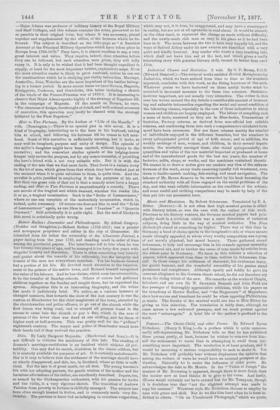Dita. By Lady Margaret Majondie. (Blackwood and Sons.)—It is not
difficult to criticise the machinery of this tale. The stealing of Assanta's marriage-certificates is an incident which violates all pro- bability. One may find its match, doubtless, in the causes alebres, but it is scarcely available for purposes of art. It is certainly melodramatic. Nor is it easy to believe that the evidences of the marriage should have so utterly disappeared, and this, too, in Scotland, where so little is suffi- cient. But the tale is of great merit, for all that. The young heroine's life with her adopting parents, the gentle wisdom of the mother and the harmless affectations of the father, are excellently described. Jaques, too, so named by the Shakespearian enthusiast, with his passion for books and the violin, is a very vigorous sketch. Tho transition' of Andrew Fairdon from poverty to fortune is skilfully managed. The subject has been often enough treated in fiction, and is commonly made very dis- tasteful. The parvenu is closer bed as indulging in countless vulgarities,
which may not, it is true, be exaggerated, and may have a counterpart in reality, but are not at all agreeable to read about. It would be absurd, on the other hand, to represent the change as made without difficulty, and the newly-made rich man as easy in his place as if he had been born to it. The mean between the two is here very happily hit, and the ways of Salford Abbey under its new owners are described with a very quiet and kindly humour. Any reader who wants a very touching tale, which shall not leave him sad at the last, and whioh gives a really Interesting story with genuine literary skill, cannot do better than read Dita.






































 Previous page
Previous page